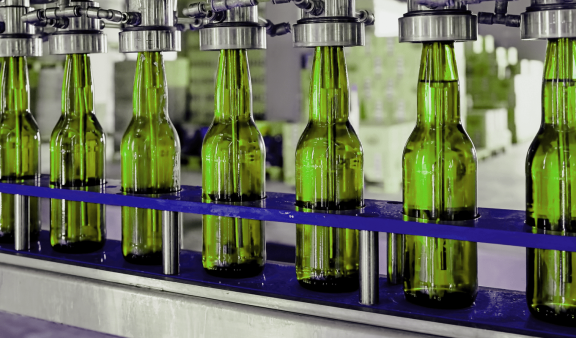
5 Ways to leverage Marketing Automation for B2B Food & Beverage
In this blog article, we aim to inspire manufacturers and wholesalers in the agri-food sector to take the next steps with Marketing Automation by providing some strategies and case studies.
Manufacturers and wholesalers in the agri-food sector are facing many challenges today - starting from globalization of the industry, rising pressures on the supply chain, changes in consumer behaviors and preferences, and higher customer expectations regarding food chain transparency, sustainability, or organic and healthier produce. Yet, these challenges should be seen as an opportunity to evolve and develop new capabilities in order to stay ahead.
Organizations in this industry are generally still lagging behind other B2B industries in terms of digitalization of their marketing and sales capabilities. In this blog we share proven strategies and examples of organizations that have applied them.
How B2B Marketing Automation helps Food Manufacturers respond to these challenges
The current digital transformation in the B2B industry is driven by B2B customers that now prefer digital channels for buying processes. According to a report from McKinsey in 2022, 2 out of 3 buyers prefer remote human interactions or digital self-service in their interactions with suppliers. Therefore, B2B organizations, and in this case the food manufacturing industry, need to adapt in order to serve their customers across whatever channels they prefer: in-person, remote, self-service digital interactions, or a mix of them if they want to stay ahead in customer experience.
To better serve customers across different channels consistently, automation and orchestration are key. Marketing automation creates the foundation for organizations to leverage and scale marketing communications to reach the right people at the right time and with the right message.
For example, thanks to marketing automation, when an existing customer shows interest in the new product line you’re launching through their engagement with the communications around that topic, your account management can be immediately notified so they can create a compelling offering to that customer and make a new sale.
This is a more cost-efficient way to reach and engage with customers than the traditional sales models that have been and are still used by organizations in this industry.
In summary, marketing automation enables marketers to provide potential customers with the right information at specific phases of the buyer journey in an automated way. This makes it one of the most powerful marketing tools for the B2B sector and a great starting point for organizations looking to better align marketing and sales in reaching business objectives.
5 strategies for B2B Food Manufacturers to leverage B2B Marketing Automation
Here we showcase 5 strategies in which Food Manufacturers can leverage customer data and Marketing Automation to drive business growth.
Depending on your level of digital maturity as an organization, E-mail, CRM and Marketing Automation platforms and solutions can be leveraged accordingly.
1. Leverage the power of E-mail
Email marketing is one of the most effective ways for B2B organizations to reach out to their prospects and clients. Why? Because it provides a direct and focused line of contact with them that can be “easily” personalized and tailored to the recipient.
In the case of food manufacturing and wholesale, E-mail marketing can be a very effective way to promote certain products to the right customer segments, and to offer personalized promotions to high value segments. E-mail is a very cost-effective channel when built correctly and offers high conversion rates and sales when managed properly.
Leveraging marketing automation via E-mail enables the creation of evergreen e-mail nurturing campaigns, “always-on”, so that once created and launched, they will always work in generating business, without any additional required effort. Automated marketing tools can help companies create a variety of conversions along the sales funnel based on a specific user's behavior, not just only marketing communications.
2. Get to know your end-customers with D2C Marketing Automation
B2B organizations have a strong opportunity to drive demand from the end points of the supply chain once they are able to directly engage with end-customers. Food manufacturers can leverage this opportunity even further because they are present in the day-to-day life of the end-customers. Driving brand awareness and a stronger connection with end-customers, will put these products or brands higher on their consideration set.
A large, internationally operating dairy cooperative, formed by dairy farmers in the Netherlands, Belgium and Germany started leveraging Marketing Automation with the purpose of reaching and getting to know their end-customers. Their approach focused on gaining customer data through subscriptions to e-mail communications, motivated by promotional benefits, such as cashbacks. E-mail campaigns were run for loyal subscriber customers, including newsletters, personalized promotions, fun contests, and brand awareness. With this approach, the brand gained access to valuable end-customer data, created a loyal base of end-customers, and drove higher demand at their local sellers.
3. Unlock the power of aligned sales and marketing teams
The value marketing automation has as a means to create alignment between sales and marketing rests on your resources' ability to provide mutually beneficial data between departments.
A well-executed marketing automation strategy provides sales teams very insightful information. These insights can go from customer specific behavior information such as product site visits or marketing engagement: “have they opened and clicked on our last e-mail and seem interested to buy more?” to what campaigns have worked with what segment or group of customers. This means an organization can identify new topics they can bring to the market or what groups of customers are already interested in their products or offerings.
Effective cold calling is definitely a thing of the past and sales reps are no longer the only point of contact between the organization and the customer. Therefore, the data gathered via marketing automation from all other channels such as website, e-mail or social, is key to understanding where in the journey your customers are, and what their needs and interests are.
According to Gartner, 60% of B2B sales organizations will transition from experience- and intuition-based selling to data-driven selling, based on facts and figures gathered from all touchpoints and channels.
4. Get strategic insights to define your go-to-market strategy
Strategically leveraging marketing automation to gather and generate insights will help you test your go-to-market approach or strategy. This use case is based on the growth hacking approach.
What’s the best way to understand the impact that the launch of a new product could have on the market, or test whether a variant of an existing product could be profitable? Test your customer base! Your customers are a good indicator of the potential success that a go-to-market strategy or product can have.
For example, you can use marketing assets and communications for your database to communicate about the launch of a new product. Depending on the results with your database, you could make some assumptions on how the product would do in the market. Organizations can apply this concept not just to products, but also to messaging, communication to certain segments and more. Applying a testing and learning mindset has been proven key to driving long-term growth in your organization.
5. Get more out of your B2B E-commerce portal/channels
By leveraging marketing automation, food manufacturers and wholesalers are able to automatically generate more leads, drive more targeted traffic to their product pages, and ultimately boost sales and revenue.
How?
Take the example of a leading food wholesaler in the Netherlands and Belgium. After the launch of their high-end E-commerce platform, they realized they needed to be relevant and attractive to their buyers on an ongoing basis to ensure customers kept coming back.
They leveraged their existing CRM customer data via personalized promotions and offers that were sent via a mix of channels, including e-mail. The combination of targeted E-commerce campaigns and personalization had a significant effect on both conversions and traffic
In summary, marketing automation is the perfect tool for B2B food and beverage manufacturing and wholesale organizations looking to gain new growth potential in their markets, become more efficient and effective at reaching new customers, but also grow the revenue and sales within their existing customer base. Marketing automation can have almost infinite applications at organizations and based on your key challenges and ambitions, different use cases can be created. The key is to get started with quick wins, and scale as you grow and develop. So, what are you waiting for? Why not get started now!
- https://atlantic-technologies.com/en/blog/crm-for-the-food-industry-how-not-miss-out-on-your-business-opportunities/
- https://aivie.ch/en/customer-case-how-your-website-automatically-wins-customers-with-aivie/
- https://www.chapsvision.com/industries/agri-food/
- https://www.forbes.com/sites/forbesbusinesscouncil/2020/10/20/a-guide-to-leveraging-marketing-automation/?sh=51ee9ae76cba
- https://www.ashworthcreative.com/blog/2019/06/b2b-manufacturing-companies-need-automated-marketing/
- https://www.mckinsey.com/capabilities/growth-marketing-and-sales/our-insights/omnichannel-in-b2b-sales-the-new-normal-in-a-year-that-has-been-anything-but
- https://www.mckinsey.com/capabilities/growth-marketing-and-sales/our-insights/the-future-of-b2b-sales-is-hybrid
- https://www.mckinsey.com/capabilities/growth-marketing-and-sales/our-insights/how-b2b-digital-leaders-drive-five-times-more-revenue-growth-than-their-peers



